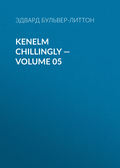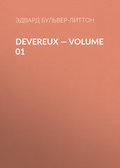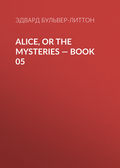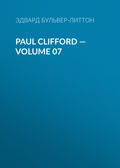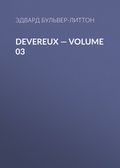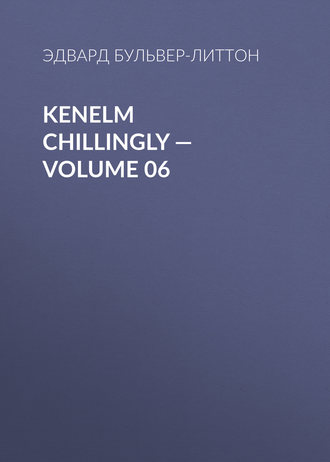
Эдвард Бульвер-Литтон
Kenelm Chillingly — Volume 06
CHAPTER IV
KENELM went with somewhat rapid pace from Mrs. Braefield's to the shop in the High Street kept by Will Somers. Jessie was behind the counter, which was thronged with customers. Kenelm gave her a brief direction about his portmanteau, and then passed into the back parlour, where her husband was employed on his baskets,—with the baby's cradle in the corner, and its grandmother rocking it mechanically, as she read a wonderful missionary tract full of tales of miraculous conversions: into what sort of Christians we will not pause to inquire.
"And so you are happy, Will?" said Kenelm, seating himself between the basket-maker and the infant; the dear old mother beside him, reading the tract which linked her dreams of life eternal with life just opening in the cradle that she rocked. He not happy! How he pitied the man who could ask such a question.
"Happy, sir! I should think so, indeed. There is not a night on which Jessie and I, and mother too, do not pray that some day or other you may be as happy. By and by the baby will learn to pray 'God bless papa, and mamma, grandmamma, and Mr. Chillingly.'"
"There is some one else much more deserving of prayers than I, though needing them less. You will know some day: pass it by now. To return to the point: you are happy; if I asked why, would you not say, 'Because I have married the girl I love, and have never repented'?"
"Well, sir, that is about it; though, begging your pardon, I think it could be put more prettily somehow."
"You are right there. But perhaps love and happiness never yet found any words that could fitly express them. Good-bye, for the present."
Ah! if it were as mere materialists, or as many middle-aged or elderly folks, who, if materialists, are so without knowing it, unreflectingly say, "The main element of happiness is bodily or animal health and strength," that question which Chillingly put would appear a very unmeaning or a very insulting one addressed to a pale cripple, who however improved of late in health, would still be sickly and ailing all his life,—put, too, by a man of the rarest conformation of physical powers that nature can adapt to physical enjoyment,—a man who, since the age in which memory commences, had never known what it was to be unwell, who could scarcely understand you if you talked of a finger-ache, and whom those refinements of mental culture which multiply the delights of the senses had endowed with the most exquisite conceptions of such happiness as mere nature and its instincts can give! But Will did not think the question unmeaning or insulting. He, the poor cripple, felt a vast superiority on the scale of joyous being over the young Hercules, well born, cultured, and wealthy, who could know so little of happiness as to ask the crippled basket-maker if he were happy.—he, blessed husband and father!
CHAPTER V
LILY was seated on the grass under a chestnut-tree on the lawn. A white cat, not long emerged from kittenhood, curled itself by her side. On her lap was an open volume, which she was reading with the greatest delight.
Mrs. Cameron came from the house, looked round, perceived the girl, and approached; and either she moved so gently, or Lily was so absorbed in the book, that the latter was not aware of her presence till she felt a light hand on her shoulder, and, looking up, recognized her aunt's gentle face.
"Ah! Fairy, Fairy, that silly book, when you ought to be at your French verbs. What will your guardian say when he comes and finds you have so wasted time?"
"He will say that fairies never waste their time; and he will scold you for saying so." Therewith Lily threw down the book, sprang to her feet, wound her arm round Mrs. Cameron's neck, and kissed her fondly. "There! is that wasting time? I love you so, aunty. In a day like this I think I love everybody and everything!" As she said this, she drew up her lithe form, looked into the blue sky, and with parted lips seemed to drink in air and sunshine. Then she woke up the dozing cat, and began chasing it round the lawn.
Mrs. Cameron stood still, regarding her with moistened eyes. Just at that moment Kenelm entered through the garden gate. He, too, stood still, his eyes fixed on the undulating movements of Fairy's exquisite form. She had arrested her favourite, and was now at play with it, shaking off her straw hat, and drawing the ribbon attached to it tantalizingly along the smooth grass. Her rich hair, thus released and dishevelled by the exercise, fell partly over her face in wavy ringlets; and her musical laugh and words of sportive endearment sounded on Kenelm's ear more joyously than the thrill of the skylark, more sweetly than the coo of the ring-dove.
He approached towards Mrs. Cameron. Lily turned suddenly and saw him. Instinctively she smoothed back her loosened tresses, replaced the straw hat, and came up demurely to his side just as he had accosted her aunt.
"Pardon my intrusion, Mrs. Cameron. I am the bearer of this note from Mrs. Braefield." While the aunt read the note, he turned to the niece.
"You promised to show me the picture, Miss Mordaunt."
"But that was a long time ago."
"Too long to expect a lady's promise to be kept?"
Lily seemed to ponder that question, and hesitated before she answered.
"I will show you the picture. I don't think I ever broke a promise yet, but I shall be more careful how I make one in future."
"Why so?"
"Because you did not value mine when I made it, and that hurt me." Lily lifted up her head with a bewitching stateliness, and added gravely, "I was offended."
"Mrs. Braefield is very kind," said Mrs. Cameron; "she asks us to dine the day after to-morrow. You would like to go, Lily?"
"All grown-up people, I suppose? No, thank you, dear aunt. You go alone, I would rather stay at home. May I have little Clemmy to play with? She will bring Juba, and Blanche is very partial to Juba, though she does scratch him."
"Very well, my dear, you shall have your playmate, and I will go by myself."
Kenelm stood aghast. "You will not go, Miss Mordaunt; Mrs. Braefield will be so disappointed. And if you don't go, whom shall I have to talk to? I don't like grown-up people better than you do."
"You are going?"
"Certainly."
"And if I go you will talk to me? I am afraid of Mr. Braefield. He is so wise."
"I will save you from him, and will not utter a grain of wisdom."
"Aunty, I will go."
Here Lily made a bound and caught up Blanche, who, taking her kisses resignedly, stared with evident curiosity upon Kenelm.
Here a bell within the house rang the announcement of luncheon. Mrs. Cameron invited Kenelm to partake of that meal. He felt as Romulus might have felt when first invited to taste the ambrosia of the gods. Yet certainly that luncheon was not such as might have pleased Kenelm Chillingly in the early days of the Temperance Hotel. But somehow or other of late he had lost appetite; and on this occasion a very modest share of a very slender dish of chicken fricasseed, and a few cherries daintily arranged on vine leaves, which Lily selected for him, contented him,—as probably a very little ambrosia contented Romulus while feasting his eyes on Hebe.
Luncheon over, while Mrs. Cameron wrote her reply to Elsie, Kenelm was conducted by Lily into her own /own/ room, in vulgar parlance her /boudoir/, though it did not look as if any one ever /bouder'd/ there. It was exquisitely pretty,—pretty not as a woman's, but as a child's dream of the own /own/ room she would like to have,—wondrously neat and cool, and pure-looking; a trellis paper, the trellis gay with roses and woodbine, and birds and butterflies; draperies of muslin, festooned with dainty tassels and ribbons; a dwarf bookcase, that seemed well stored, at least as to bindings; a dainty little writing-table in French /marqueterie/, looking too fresh and spotless to have known hard service. The casement was open, and in keeping with the trellis paper; woodbine and roses from without encroached on the window-sides, gently stirred by the faint summer breeze, and wafted sweet odours into the little room. Kenelm went to the window, and glanced on the view beyond. "I was right," he said to himself; "I divined it." But though he spoke in a low inward whisper, Lily, who had watched his movements in surprise, overheard.
"You divined it. Divined what?"
"Nothing, nothing; I was but talking to myself."
"Tell me what you divined: I insist upon it!" and Fairy petulantly stamped her tiny foot on the floor.
"Do you? Then I obey. I have taken a lodging for a short time on the other side of the brook,—Cromwell Lodge,—and seeing your house as I passed, I divined that your room was in this part of it. How soft here is the view of the water! Ah! yonder is Izaak Walton's summer-house."
"Don't talk about Izaak Walton, or I shall quarrel with you, as I did with Lion when he wanted me to like that cruel book."
"Who is Lion?"
"Lion,—of course, my guardian. I called him Lion when I was a little child. It was on seeing in one of his books a print of a lion playing with a little child."
"Ah! I know the design well," said Kenelm, with a slight sigh. "It is from an antique Greek gem. It is not the lion that plays with the child, it is the child that masters the lion, and the Greeks called the child 'Love.'"
This idea seemed beyond Lily's perfect comprehension. She paused before she answered, with the naivete of a child six years old,—
"I see now why I mastered Blanche, who will not make friends with any one else: I love Blanche. Ah, that reminds me,—come and look at the picture."
She went to the wall over the writing-table, drew a silk curtain aside from a small painting in a dainty velvet framework, and pointing to it, cried with triumph, "Look there! is it not beautiful?"
Kenelm had been prepared to see a landscape, or a group, or anything but what he did see: it was the portrait of Blanche when a kitten.
Little elevated though the subject was, it was treated with graceful fancy. The kitten had evidently ceased from playing with the cotton reel that lay between her paws, and was fixing her gaze intently on a bulfinch that had lighted on a spray within her reach.
"You understand," said Lily, placing her hand on his arm, and drawing him towards what she thought the best light for the picture; "it is Blanche's first sight of a bird. Look well at her face; don't you see a sudden surprise,—half joy, half fear? She ceases to play with the reel. Her intellect—or, as Mr. Braefield would say, 'her instinct'—is for the first time aroused. From that moment Blanche was no longer a mere kitten. And it required, oh, the most careful education, to teach her not to kill the poor little birds. She never does now, but I had such trouble with her."
"I cannot say honestly that I do see all that you do in the picture; but it seems to me very simply painted, and was, no doubt, a striking likeness of Blanche at that early age."
"So it was. Lion drew the first sketch from life with his pencil; and when he saw how pleased I was with it—he was so good—he put it on canvas, and let me sit by him while he painted it. Then he took it away, and brought it back finished and framed as you see, last May, a present for my birthday."
"You were born in May—with the flowers."
"The best of all the flowers are born in May,—violets."
"But they are born in the shade, and cling to it. Surely, as a child of May, you love the sun!"
"I love the sun; it is never too bright nor too warm for me. But I don't think that, though born in May, I was born in sunlight. I feel more like my own native self when I creep into the shade and sit down alone. I can weep then."
As she thus shyly ended, the character of her whole countenance was changed: its infantine mirthfulness was gone; a grave, thoughtful, even a sad expression settled on the tender eyes and the tremulous lips.
Kenelm was so touched that words failed him, and there was silence for some moments between the two. At length Kenelm said, slowly,—
"You say your own native self. Do you, then, feel, as I often do, that there is a second, possibly a /native/, self, deep hid beneath the self,—not merely what we show to the world in common (that may be merely a mask), but the self that we ordinarily accept even when in solitude as our own, an inner innermost self, oh so different and so rarely coming forth from its hiding-place, asserting its right of sovereignty, and putting out the other self as the sun puts out a star?"
Had Kenelm thus spoken to a clever man of the world—to a Chillingly Mivers, to a Chillingly Gordon—they certainly would not have understood him. But to such men he never would have thus spoken. He had a vague hope that this childlike girl, despite so much of childlike talk, would understand him; and she did at once.
Advancing close to him, again laying her hand on his arm, and looking up towards his bended face with startled wondering eyes, no longer sad, yet not mirthful,—
"How true! You have felt that too? Where /is/ that innermost self, so deep down,—so deep; yet when it does come forth, so much higher,—higher,—immeasurably higher than one's everyday self? It does not tame the butterflies; it longs to get to the stars. And then,—and then,—ah, how soon it fades back again! You have felt that. Does it not puzzle you?"
"Very much."
"Are there no wise books about it that help to explain?"
"No wise books in my very limited reading even hint at the puzzle. I fancy that it is one of those insoluble questions that rest between the infant and his Maker. Mind and soul are not the same things, and what you and I call 'wise men' are always confounding the two—"
Fortunately for all parties—especially the reader; for Kenelm had here got on the back of one of his most cherished hobbies, the distinction between psychology and metaphysics, soul and mind scientifically or logically considered—Mrs. Cameron here entered the room, and asked him how he liked the picture.
"Very much. I am no great judge of the art. But it pleased me at once, and now that Miss Mordaunt has interpreted the intention of the painter I admire it yet more."
"Lily chooses to interpret his intention in her own way, and insists that Blanche's expression of countenance conveys an idea of her capacity to restrain her destructive instinct, and be taught to believe that it is wrong to kill birds for mere sport. For food she need not kill them, seeing that Lily takes care that she has plenty to eat. But I don't think that Mr. Melville had the slightest suspicion that he had indicated that capacity in his picture."
"He must have done so, whether he suspected it or not," said Lily, positively; "otherwise he would not be truthful."
"Why not truthful?" asked Kenelm.
"Don't you see? If you were called upon to describe truthfully the character of any little child, would you only speak of such naughty impulses as all children have in common, and not even hint at the capacity to be made better?"
"Admirably put!" said Kenelm. "There is no doubt that a much fiercer animal than a cat—a tiger, for instance, or a conquering hero—may be taught to live on the kindest possible terms with the creatures on which it was its natural instinct to prey."
"Yes, yes; hear that, aunty! You remember the Happy Family that we saw eight years ago, at Moleswich fair, with a cat not half so nice as Blanche allowing a mouse to bite her ear? Well, then, would Lion not have been shamefully false to Blanche if he had not"—
Lily paused and looked half shyly, half archly, at Kenelm, then added, in slow, deep-drawn tones—"given a glimpse of her innermost self?"
"Innermost self!" repeated Mrs. Cameron, perplexed and laughing gently.
Lily stole nearer to Kenelm and whispered,—
"Is not one's innermost self one's best self?"
Kenelm smiled approvingly. The fairy was rapidly deepening her spell upon him. If Lily had been his sister, his betrothed, his wife, how fondly he would have kissed her! She had expressed a thought over which he had often inaudibly brooded, and she had clothed it with all the charm of her own infantine fancy and womanlike tenderness. Goethe has said somewhere, or is reported to have said, "There is something in every man's heart, that, if you knew it, would make you hate him." What Goethe said, still more what Goethe is reported to have said, is never to be taken quite literally. No comprehensive genius—genius at once poet and thinker—ever can be so taken. The sun shines on a dunghill. But the sun has no predilection for a dunghill. It only comprehends a dunghill as it does a rose. Still Kenelm had always regarded that loose ray from Goethe's prodigal orb with an abhorrence most unphilosophical for a philosopher so young as generally to take upon oath any words of so great a master. Kenelm thought that the root of all private benevolence, of all enlightened advance in social reform, lay in the adverse theorem,—that in every man's nature there lies a something that, could we get at it, cleanse it, polish it, render it visibly clear to our eyes, would make us love him. And in this spontaneous, uncultured sympathy with the results of so many laborious struggles of his own scholastic intellect against the dogma of the German giant, he felt as if he had found a younger—true, but oh, how much more subduing, because so much younger—sister of his own man's soul. Then came, so strongly, the sense of her sympathy with his own strange innermost self, which a man will never feel more than once in his life with a daughter of Eve, that he dared not trust himself to speak. He somewhat hurried his leave-taking.
Passing in the rear of the garden towards the bridge which led to his lodging, he found on the opposite bank, at the other end of the bridge, Mr. Algernon Sidney Gale Jones peacefully angling for trout.
"Will you not try the stream to-day, sir? Take my rod." Kenelm remembered that Lily had called Izaak Walton's book "a cruel one," and shaking his head gently, went his way into the house. There he seated himself silently by the window, and looked towards the grassy lawn and the dipping willows, and the gleam of the white walls through the girdling trees, as he had looked the eve before.
"Ah!" he murmured at last, "if, as I hold, a man but tolerably good does good unconsciously merely by the act of living,—if he can no more traverse his way from the cradle to the grave, without letting fall, as he passes, the germs of strength, fertility, and beauty, than can a reckless wind or a vagrant bird, which, where it passes, leaves behind it the oak, the corn-sheaf, or the flower,—ah, if that be so, how tenfold the good must be, if the man find the gentler and purer duplicate of his own being in that mysterious, undefinable union which Shakspeares and day-labourers equally agree to call love; which Newton never recognizes, and which Descartes (his only rival in the realms of thought at once severe and imaginative) reduces into links of early association, explaining that he loved women who squinted, because, when he was a boy, a girl with that infirmity squinted at him from the other side of his father's garden-wall! Ah! be this union between man and woman what it may; if it be really love, really the bond which embraces the innermost and bettermost self of both,—how daily, hourly, momently, should we bless God for having made it so easy to be happy and to be good!"



